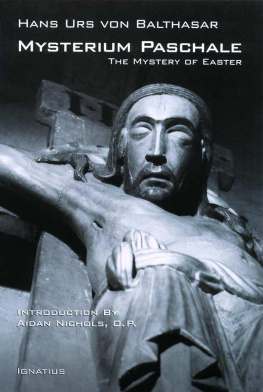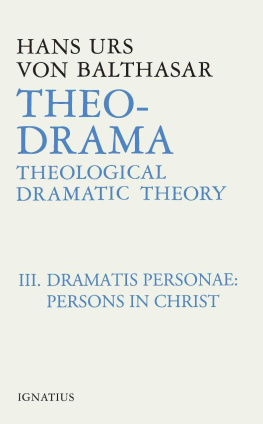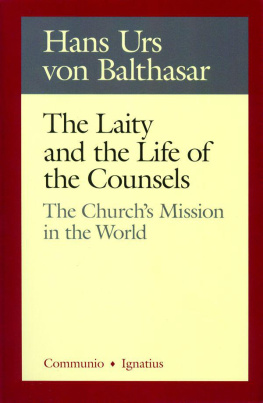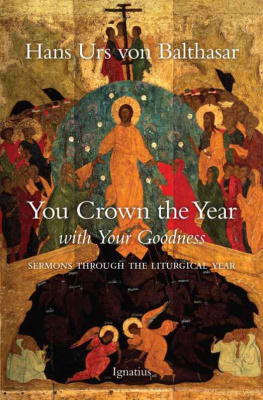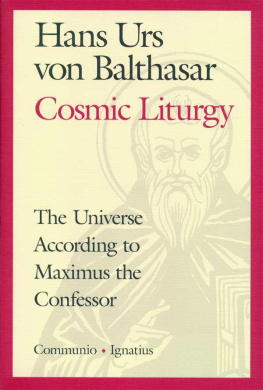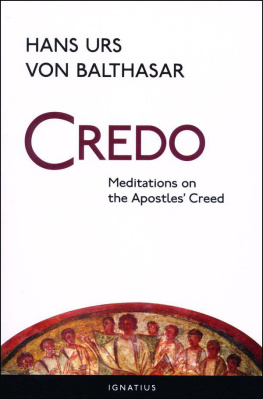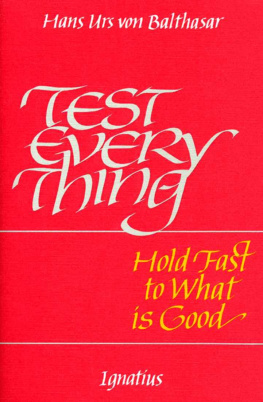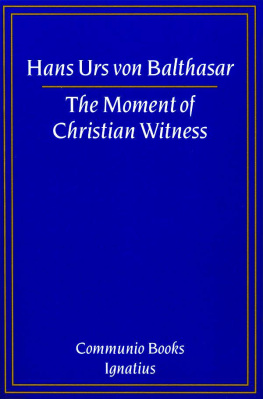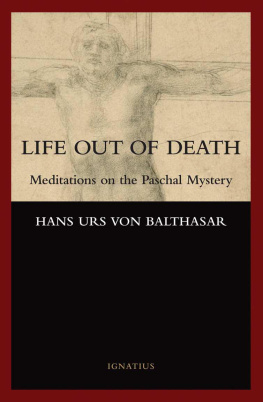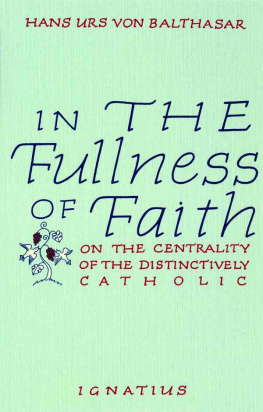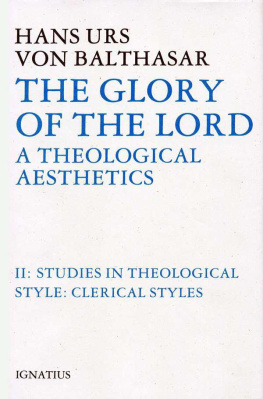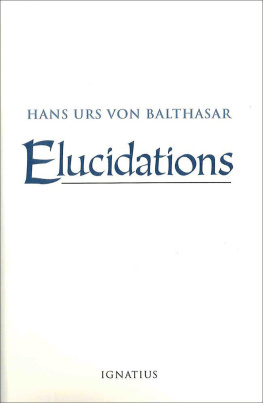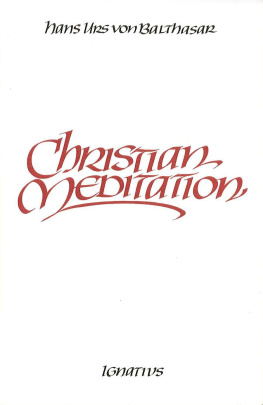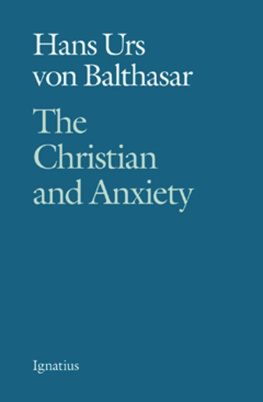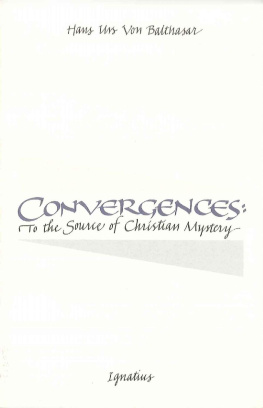MYSTERIUM PASCHALE
MYSTERIUM PASCHALE
The Mystery of Easter
Hans Urs von Balthasar
Translated with an Introduction
by
Aidan Nichols, O.P.
IGNATIUS PRESS SAN FRANCISCO
Original German edition:
Theologie der Drei Tage
1970 by Benzinger Verlag, Einsiedeln
Reprinted by St. Benno-Verlag Leipzig, 1983
and including additions made to the second French edition
Pques le Mystre , copyright 1981 by Les Editions du Cerf, Paris
English translation copyright 1990 by T&T Clark
All rights reserved
No part of this publication may be reproduced, stored in a retrieval system, or transmitted,
in any form or by any means, electronic, mechanical, photocopying, recording or
otherwise, without the prior permission of T&T Clark.
Cover art:
Crucifix of Archbishop Gera
10th century, Ottoman
Cathedral, Cologne, Germany
Foto Marburg / Art Resource, New York
Cover design by Roxanne Mei Lum
Published by Ignatius Press 2000, 2005
ISBN 978-0-89870-804-2
ISBN 0-89870-804-4
Library of Congress Control Number 00-100818
Printed in the United States of America
Contents
(1) The Incarnation as Ordered to the Passion
(2) Endorsement in Scripture
(3) Confirmation in Tradition
(4) The Kenosis and the New Image of God
(5) Literature
(1) The Hiatus
(2) The Word of the Cross and its Logic
(3) The Cross and Philosophy
(4) The Bridge over the Hiatus
(5) Experiential Approach to the Hiatus
(1) Jesus Life as Directed to the Cross
(2) The Eucharist
(3) The Mount of Olives
(4) Surrender
(5) Trial and Condemnation
(6) The Crucifixion
(7) Cross and Church
(8) Cross and Trinity
(1) Preliminaries on Method
(2) The New Testament
(3) Solidarity in Death
(4) The Being Dead of the Son of God
(1) The Fundamental Theological Affirmation
(2) The Exegetical Situation
(3) The Imagistic Development of the Theological Aspects
Preface to the Second Edition
This book appeared for the first time as a constituent chapter of a large-scale dogmatics. Since in that context the doctrine of God as one and triune was treated elsewhere, there was no need to examine in any more fundamental a way the delicate problem (so warmly discussed nowadays) of the Kenosis of the Son of God in his Incarnation and, above all, in his Passion. Here, by contrast, it seems incumbent on me to say a wordno doubt, too condensedby way of addressing the root of this mystery. I hope that it will be clear enough, at any rate, to remove certain misunderstandings of the grosser sort.
For a number of years, indeed, the idea of a suffering God has become virtually omnipresent. Kitamori put it into official circulation. American Process Theology nourished it. Then there were the polemics against the divine impassibility (so strongly affirmed by the Church Fathers), and against Gods immutability (denied, or so it seemed, by numerous Old Testament passages), as well as the Hegelianising theology of Jurgen Moltmann in his Theology of Hope, The Crucified God , and The Trinity and the Kingdom of God . All that appeared to suggest to Christians that the older dogmatics had blundered on an essential point of its interpretation of biblical revelation.
Doubtless the Kenosis of the Son will always remain a mystery no less unsoundable than that of the Trinity of hypostases in the single God. And yet, by placing the emphasis, in the doctrine of the Kenosis, so exclusively on the human nature assumed by the Son, or on his act of assuming that naturethe divine nature remaining inaccessible to all becoming or change, and even to any real relationship with the world one was running the risk of under-estimating the weight of the assertions made in Scripture, and of succumbing at once to both Nestorianism and Monophysitism. Only the Jesus of history would do the suffering, or perhaps the lower faculties in Christs being, whereas the fine point of his soul remained, even in the moment of the abandonment, united to the Father in a beatific vision which could never be interrupted.
It seems to me that the only way which might avoid the two opposed and incompatible extremes is that which relates the event of the Kenosis of the Son of God to what one can, by analogy, designate as the eternal event of the divine processions. It is from that supra-temporal yet ever actual event that, as Christians, we must approach the mystery of the divine essence. That essence is forever given in the self-gift of the Father, rendered in the thanksgiving of the Son, and represented in its character as absolute love by the Holy Spirit.
According to the great Scholastics, the inner-divine processions are the condition of possibility for a creation. The divine ideas for a possible world derive from that everlasting circulation of life, founded as it is on the total and unconditional gift of each hypostasis to the others. De necessitate si est productio dissimilis praeintelligitur productio similis (Saint Bonaventure). Ex processione personarum divinarum distinctarum causatur omnis creaturarum processio et multiplicatio (Saint Thomas).
We shall never know how to express the abyss-like depths of the Fathers self-giving, that Father who, in an eternal super-Kenosis, makes himself destitute of all that he is and can be so as to bring forth a consubstantial divinity, the Son. Everything that can be thought and imagined where God is concerned is, in advance, included and transcended in this self-destitution which constitutes the person of the Father, and, at the same time, those of the Son and the Spirit. God as the gulf (Eckhart: Un-Grund ) of absolute Love contains in advance, eternally, all the modalities of love, of compassion, and even of a separation motivated by love and founded on the infinite distinction between the hypostasesmodalities which may manifest themselves in the course of a history of salvation involving sinful humankind.
God, then, has no need to change when he makes a reality of the wonders of his charity, wonders which include the Incarnation and, more particularly, the Passion of Christ, and, before him, the dramatic history of God with Israel and, no doubt, with humanity as a whole. All the contingent abasements of God in the economy of salvation are forever included and outstripped in the eternal event of Love. And so what, in the temporal economy, appears as the (most real) suffering of the Cross is only the manifestation of the (Trinitarian) Eucharist of the Son: he will be forever the slain Lamb, on the throne of the Fathers glory, and his Eucharistthe Body shared out, the Blood poured forthwill never be abolished, since the Eucharist it is which must gather all creation into his body. What the Father has given, he will never take back.
Hans Urs von Balthasar
Abbreviations
AJSL American Journal of Semitic Languages and Literatures (Chicago 1895-1941)
Anal. Greg. Analecta Gregoriana (Rome 193 off)
BZ Biblische Zeitschrift (Paderborn 1903ff)
BZNW Beihefte zur Zeitschrift fur die Neutestamentliche Wissenschaft (Berlin 1923ff)
CSEL Corpus Scriptorum Ecclesiasticorum Latinorum (Vienna 1866ff)
DACL Dictionnaire darchologie chrtienne et liturgie (Paris 1903-1953)
DBS Dictionnaire de la Bible. Supplment (Paris 1928ff)
DLZ Deutsche Literaturzeitung (Berlin 1880ff)
DS Enchiridion symbolorum. Ed. H. Denzinger / A. Schnmetzer (Freiburg33 1965)
DSAM Dictonnaire de spiritualite, ascetique et mystique (Paris 1932ff)
EO Echos dOrient (Bucharest 1897-1943)
ET Expository Times (Edinburgh 1889ff)
EvTh Evangelische Theologie (Munich 1934ff)
GCS Die griechischen christlichen Schriftsteller der ersten drei Jahrhunderte (Berlin 1897ff)
Next page
